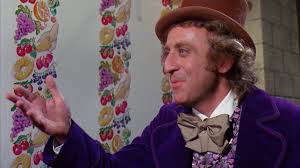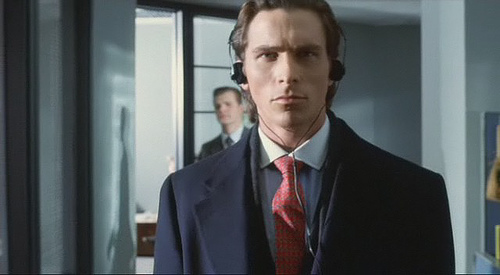 |
Tom Hanks in "Forrest Gump" courtesy
of jonathanrosenbaum.com |
Everybody has that pretentious friend that, every time you rave about a motion picture, says (in pure Jim Gaffigan style) "the book was MUCH better than the movie." Well, speaking as a person who has really only read two novels before seeing the films (and I didn't care much for either film), I usually prefer the movies rather than sitting down and reading. Regardless how I feel (or anybody for that matter), there are some authors, regardless of how successful the films are, that don't think their work should exist in any form but their own (though they gave the "OK" to do it). Below are the five best films for which their source's authors hold nothing but disdain. This isn't to say any of these films are better than their respective books, but the writers who put pen to paper certainly won't ever think so.
 |
| courtesy of andsoitbegins.com |
Willy Wonka and the Chocolate Factory (1971)
Author: Roald Dahl
Unless you saw the Johnny Depp/Tim Burton version first or are clinically insane, you probably prefer the original Gene Wilder-starring vehicle that added a sense of visual magic to Dahl's beloved novel. Unfortunately, Dahl had the opposite point of view (essentially why we never saw an adaptation of Charlie and Glass Elevator). Dahl felt Wilder's portrayal of the candy genius was "pretentious" and "bouncy." He also felt the film was terribly directed by oft-documentarian Mel Stuart. While Dahl's criticisms may be well-founded (especially if you adopt the point of view that it's surprisingly dark for a family film), the original adaptation stands up as one of the most beloved films of all time by children and parents alike. Dahl passed away in 1990, long before Burton's version, which took a few other liberties with the story. Who knows if he would have preferred it or not.
 |
| courtesy of hyperquake.com |
A Clockwork Orange (1971)
Author: Anthony Burgess
Not only did Burgess hate Stanley Kubrick's adaptation of his novel, he eventually regretted ever writing it at all. Burgess said the film "made it easy for readers of the book to misunderstand what it
was about, and the misunderstanding will pursue me till I die. I should
not have written the book because of this danger of misinterpretation." Now, not writing a seminal piece of fiction just because people might take it differently than you want is ridiculous, but A Clockwork Orange is easily his most widely respected work. But, Kubrick is known for taking a much more visual and stylistic approach to his adaptations (more to come), and Burgess felt the film did nothing but glorify the sex and violence that really only filled in the edges of his classic novel. I tried to read the book once - it's written from Alex's point of view using his insane slang, so it gets monotonous.
 |
| courtesy of ew.com |
One Flew Over the Cuckoo's Nest (1975)
Author: Ken Kesey
Rumors circulated that Kesey actually never even watched this Oscar winner before he died (his wife later said he did and was happy the film was made). But, for a long time, Kesey was outspoken about the decisions made by director Milos Forman and screenwriters Lawrence Nauben and Bo Goldman. Kesey was originally slated to help with the production, but left two weeks in. Kesey's novel is actually written from the point of view of Chief Bromden, an aspect Kesey felt was imperative to tell the story. The film refocused it and made Randall McMurphy the protagonist and cast Jack Nicholson in the Oscar-winning role. Kesey never really came around on this brilliant film, but at least his animosity eventually faded a little.
 |
| courtesy of coolhd.org |
The Shining (1980)
Author: Stephen King
In what may be the most famous case of this topics, Stanley Kubrick's adaptation of Stephen King's novel not only was met with anger and hatred, but eventually was re-adapted by the author himself in a three-part rebuttal version of the book. While the book plays out more like a family drama before the Overlook Hotel comes into play (Jack is a recovering alcoholic who's battle with internal demons helps drive the story), Kubrick abandons a lot of the emotion behind the story in favor of groundbreaking visual design and set work. King's novel focuses on how internal strife can manifest itself, while Kubrick's looks much harder at how isolation can destroy an already unstable mind. King felt Nicholson was miscast, as he already personified "crazy" too much, instead of a gradual descent into madness. That may be true, but King's 1997 attempt to rectify problems with Steven Weber as the lead is an arduous mess.
 |
| courtesy of slowcoustic.com |
American Psycho (2000)
Author: Bret Easton Ellis
Bret Easton Ellis doesn't really like any of the films adapted from his work (i.e. Less Than Zero, Rules of Attraction to a point), but this one is the best of the group. Ellis believes the story is meant as a novel because it can maintain ambiguity. Patrick Bateman was defined as an unreliable narrator in the novel and, though the movie achieves this up to a point, Ellis still says that "the film demands answers." While he has a very valid point, the aggressively violent and stylish adaptation with Christian Bale in the lead is infectious and stimulating all the same. It's certainly a story that needs to be either seen or read, but probably not both.
Any other cases of this that I forgot? Let me know and I'll store them in my brain's trivia database.






No comments:
Post a Comment